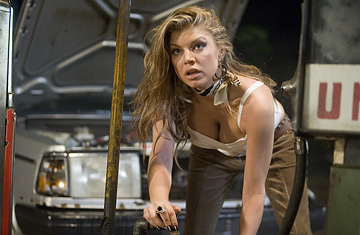
Stacy "Fergie" Ferguson is Tammy in Robert Rodriguez's Planet Terror/Grindhouse.
(2 of 3)
With its bio-conspiracy angle and other modern contrivances, Planet Terror is less a remake of grindhouse movies than Rodriguez's light-hearted spinoff of his 2005 Sin City; the gravity of that superb multi-story narrative gives way to this entertaining stew of attitudes and effects. What he did take from the old exploitation films is their mantra and mandate: If it's forbidden, do it. That had a subversive impact when Hollywood still offered a comfortable middle-brow formula to rebel against. Now, when movie outlawry is the status quo, a frolic like Planet Terror can't be more than ribald filigreeing on the standard wirework. A truly daring retro movie would have to be... nice.
THE SHAKESPEARE OF SCHLOCK
"I've always had a thought maybe that I might have been Shakespeare in another life. I don't really believe that 100%, and I don't really care about Shakespeare, I've never been into Shakespeare, but then people are constantly bringing up all of these qualities in my work that mirror Shakespearean tragedies and moments and themes."
— Quentin Tarantino in GQ
Nice one-two punch, comparing yourself to the world's greatest dramatist, whom you don't like. I'm almost as big a fan of Tarantino's dialogue as he is, but I'm hard-pressed to see the connection between the Bard and the Video Store Boy. Except, perhaps, for Hamlet's threat to Claudius (in iambic hexameter): "I'm gonna go Elizabethan on your ass."
QT's contribution to the Grindhouse evening, Death Proof, shares a few things with Planet Terror: some subsidiary characters, a love of fast cars and extreme violence and an irresistible impulse to display the amputated legs of beautiful women. But unlike Rodriguez's sprawling homage-parody, Death Proof has a one-track, four-lane mind.
It's a car-chase movie, inspired by a few auto-erotic non-classics of the Vietnam era. In the 1971 Vanishing Point, a former cop and race-car driver named Kowalski (Barry Newman) decides, for no reason more compelling than a bet he made with his drug dealer, to get his 1970 Dodge Challenger R/T with a 440 cubic-inch V-8 from Colorado to San Francisco in 16 hours. As the highway patrols of four states try to stop Kowalski, a black DJ (Cleavon Little) feeds him info about the pursuit while mythologizing him as "the electric centaur, the demigod, the superdriver of the golden west... our soul hero in his soulmobile... the last beautiful free soul on this planet." And finally: "the last American hero to whom speed means freedom of the soul."
Surely not the last, or the first. Vanishing Point came after a bunch of motorcycle movies (Hell's Angels, Easy Rider) and spurred a host of mad-dash car films (Dirty Mary Crazy Larry, Gone in 60 Seconds), many of them referenced in Death Proof. One character cites "Gone in 60 Seconds — the real one," as opposed to the Nicolas Cage remake in 2000. You'll also find allusions to the Zatoichi blind-swordsman movies from Japan and the earlier films of Tarantino's star, Kurt Russell.
